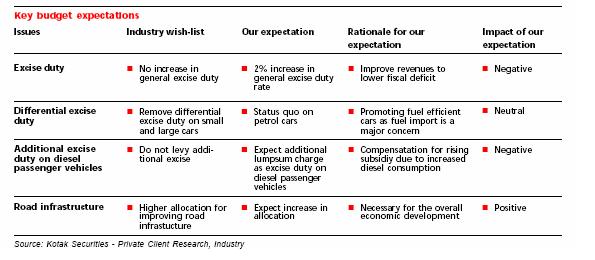If a tax on diesel vehicles is announced in the Union Budget, Maruti Suzuki, the country’s largest car maker, could be one of the worst affected as it derives about 30 percent of its revenues from diesel vehicles, according to a report from Deutsche Bank. [caption id=“attachment_230863” align=“alignleft” width=“380” caption=“Nearly 37 percent of all new car sales were of diesel-engine cars, primarily because of the widening gap between the prices of petrol and diesel per litre. Reuters”]
 [/caption] However, the impact on Mahindra and Mahindra is likely to be less severe because the company’s models face little or no threats from petrol-engine vehicles, the brokerage added. A tax on diesel vehicles is not the only thing that is worrying auto manufacturers. There’s intense speculation that excise duties could also be hiked on most vehicles (barring passenger vehicles and utility vehicles (UVs): Deutsche Bank believes duties could be hiked by 200 basis points for larger cars (>1500 cc), while they could be raised by 200 basis points to 24 percent for UVs.
[/caption] However, the impact on Mahindra and Mahindra is likely to be less severe because the company’s models face little or no threats from petrol-engine vehicles, the brokerage added. A tax on diesel vehicles is not the only thing that is worrying auto manufacturers. There’s intense speculation that excise duties could also be hiked on most vehicles (barring passenger vehicles and utility vehicles (UVs): Deutsche Bank believes duties could be hiked by 200 basis points for larger cars (>1500 cc), while they could be raised by 200 basis points to 24 percent for UVs.
 A Kotak Securities report echoed a similar sentiment. “Given increased fiscal deficit, we expect the general excise duty rate to increase by two percent and expect the auto manufacturer’s to pass on the hike as the current operating margins leaves little scope for the players to absorb the same”, it said. Morgan Stanley, however, is playing contrarian: it believes excise duties might not be hiked for the sector given its sluggish sales in the past year. Historically, excise duty hikes have been announced during periods of robust auto sector growth. However, it expects a Rs 25,000 duty on diesel cars and UVs against the general market expectation of Rs 80,000. No doubt, news on a tax on diesel vehicles is being closely watched. Several manufacturers have been investing in expanding diesel-engine vehicles; the viability of these expansion could come under threat if a heavy tax is slapped on these vehicles because it could affect demand. Apart from the tax, there is also a possibility that there could be a hike in fuel prices of diesel. Diesel vehicles have been among the few bright spots in a sagging automobile market in 2011. Nearly 37 percent of all new car sales were of diesel-engine cars, primarily because of the widening gap between the prices of petrol and diesel per litre. We’ll have to wait for 16 March, when the Union Budget will be announced, to find out if the trend will continue.
A Kotak Securities report echoed a similar sentiment. “Given increased fiscal deficit, we expect the general excise duty rate to increase by two percent and expect the auto manufacturer’s to pass on the hike as the current operating margins leaves little scope for the players to absorb the same”, it said. Morgan Stanley, however, is playing contrarian: it believes excise duties might not be hiked for the sector given its sluggish sales in the past year. Historically, excise duty hikes have been announced during periods of robust auto sector growth. However, it expects a Rs 25,000 duty on diesel cars and UVs against the general market expectation of Rs 80,000. No doubt, news on a tax on diesel vehicles is being closely watched. Several manufacturers have been investing in expanding diesel-engine vehicles; the viability of these expansion could come under threat if a heavy tax is slapped on these vehicles because it could affect demand. Apart from the tax, there is also a possibility that there could be a hike in fuel prices of diesel. Diesel vehicles have been among the few bright spots in a sagging automobile market in 2011. Nearly 37 percent of all new car sales were of diesel-engine cars, primarily because of the widening gap between the prices of petrol and diesel per litre. We’ll have to wait for 16 March, when the Union Budget will be announced, to find out if the trend will continue.
Budget 2012: Why Maruti will be worst-hit by a diesel car tax
Sanjit Oberai
• March 1, 2012, 16:48:43 IST
Maruti Suzuki, the country’s largest car maker, could be one of the worst affected as it derives about 30 percent of its revenues from diesel vehicles.
Advertisement
)
End of Article